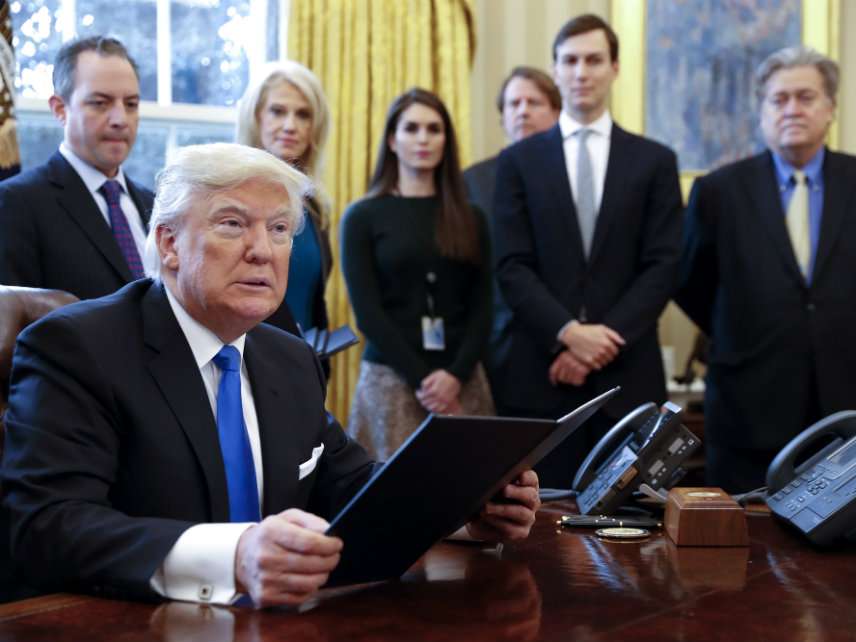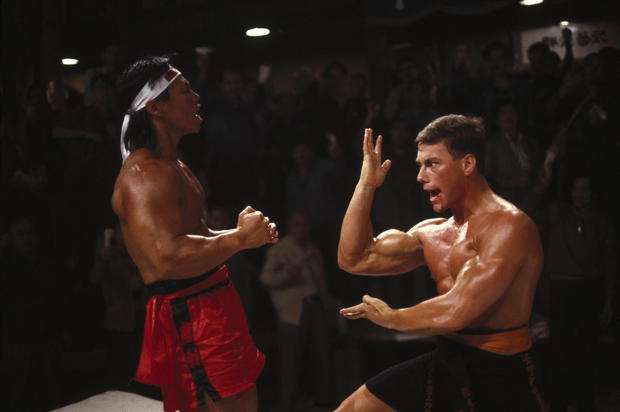Trump Didn't Demand to Watch the Gorilla Channel, but He Did Fast-Forward Through the Exposition in Bloodsport
Sorting out truth from gossip and rumor in Michael Wolff's new book.

Michael Wolff's new book on the Trump presidency, Fire and Fury: Inside the Trump White House, has generated a lot of attention and controversy recently, both for its apparent revelations about the chaos in the White House, and for the vague sourcing and hard-to-believe anecdotes. (Did Trump, who has tweeted repeatedly about John Boehner over the years, really not know who the former Speaker of the House was?)
The book has already sparked a feud between the president and his former adviser, Steve Bannon. And yesterday, Trump's legal team demanded that the publisher cease and desist publication. The publisher responded by releasing it four days early, and a number of journalists spent the evening pouring through the book, hunting for scoops.
Which led to tweets like this one getting passed around Twitter all evening:
Wow, this extract from Wolff's book is a shocking insight into Trump's mind: pic.twitter.com/1ZecclggSa
— the gorilla channel thing is a joke (@pixelatedboat) January 5, 2018
It's a gag, of course, but what really makes it sharp is that it manages to be funny about both Trump and about Wolff's steely-toned, can-you-believe-this-happened style of reporting.
At the same time, the number of people who responded to this obviously ridiculous scenario by seeming to believe it has inadvertently highlighted the way that a certain type of Trump critic will believe nearly anything about him that they see being shared on Twitter.
Up to a certain point, I suppose you can almost see how someone might be fooled. After all, the following story about Trump from a 1997 New Yorker profile, told by a reporter joining Trump on his private plane, is apparently true:
We hadn't been airborne long when Trump decided to watch a movie. He'd brought along "Michael," a recent release, but twenty minutes after popping it into the VCR he got bored and switched to an old favorite, a Jean Claude Van Damme slugfest called "Bloodsport," which he pronounced "an incredible, fantastic movie." By assigning to his son the task of fast-forwarding through all the plot exposition—Trump's goal being "to get this two-hour movie down to forty-five minutes"—he eliminated any lulls between the nose hammering, kidney tenderizing, and shin whacking. When a beefy bad guy who was about to squish a normal-sized good guy received a crippling blow to the scrotum, I laughed. "Admit it, you're laughing!" Trump shouted. "You want to write that Donald Trump was loving this ridiculous Jean Claude Van Damme movie, but are you willing to put in there that you were loving it, too?"
(In fairness to the president, this is probably the optimal way to watch Bloodsport.)
My sense, based on the excerpts we've seen so far, is that Wolff's book probably relies in part on dubious gossip. Much of it, I suspect, is based in partial truth, or at least in things that Wolff was told, but that Wolff, who has a history of producing journalism that relies on synthesis and creative interpretation, did not always make an effort to fully verify. As Andrew Prokop writes, the book is probably "a collection of stuff Wolff heard"—which is not the same as saying that it's entirely, strictly true.
At the same time, Wolff isn't just concocting stories out of whole cloth.

He does appear to have been present for at least some of the events he describes. A private dinner with Steve Bannon and Roger Ailes that figures heavily into Wolff's excerpt in New York Magazine turns out to have taken place at Wolff's house. He had consistent access to top players in the White House. Wolff reportedly has hours of interviews on tape, and Steve Bannon has not disputed any of the incendiary quotes Wolff attributes to him.
And the basic picture that Wolff paints of a chaotic White House operation that revolves around a mercurial and easily distracted president who simply wasn't prepared for the role is one that has been described before, and confirmed by any number of more rigorous high-profile political journalists. For what it's worth, I consistently encounter the same impressions in my own conversations with others in Washington: People who work in Trump's orbit find it difficult to get him to focus or process information, and find him tempermentally unfit for the demands of the presidency.
So it would be a mistake, I think, to simply dismiss Wolff's book as a work of pure fiction or baseless speculation. Yet it's also worth approaching any individual story or event it describes with some amount of skepticism, unless independently corroborated or backed up with some sort of verification. The book is probably best understood primarily as a vividly written, impressionistic account, one that offers a true-enough sense of the inner workings of a uniquely disorganized White House along with some gossipy embellishments and hyperbole. It's a book, in other words, that's going to start a lot of arguments, but won't settle many of them.
In the meantime, whatever else happens, I hope some deep-pocketed media-startup investor realizes that a Gorilla Channel is actually a great idea. And maybe someday, if we're really lucky, we'll get a Trump-authorized cut of Bloodsport too.


Show Comments (83)